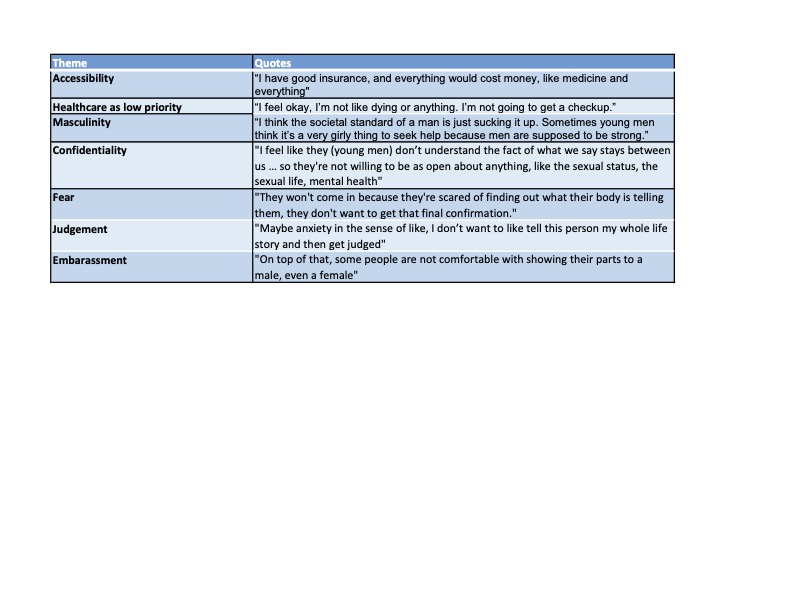Health Services Research
Session: Health Services Research 2: Novel Methods and Disparities
306 - Exploring Barriers to Healthcare Utilization Among Young Men
Saturday, May 4, 2024
3:30 PM - 6:00 PM ET
Poster Number: 306
Publication Number: 306.1122
Publication Number: 306.1122

Parker Cole (he/him/his)
Medical Student
Albert Einstein College of Medicine
Bronx, New York, United States
Presenting Author(s)
Background: Health care utilization among young men decreases significantly after age eighteen. Our prior qualitative research with adolescent males ages 13-17 years old in the Bronx, NY revealed fear, shame, embarrassment, and concerns about masculinity as potential barriers to accessing healthcare. (PAS 2023)
Objective: To determine if healthcare concerns for older adolescent males are similar to the younger cohort.
Design/Methods: Setting: One hospital-based and one-community-based clinic in the Bronx, NY.
Participants: Young men ages 18-28 years old with at least one routine visit at either clinic.
Instrument: Semi-structured one-on-one interviews. Four questions were asked: What do you think are the biggest health problems for young men your age?; What are some of the reasons you think young men your age go to the doctor?; What are some of the reasons young men your age do not go to the doctor?; What would help young men to seek health care?. Interviews were recorded and professionally transcribed. Transcripts were analyzed utilizing line-by-line open coding by two researchers. Themes were generated and categorized through consensus discussions with the third researcher, with illustrative quotes identified.
Results: Sixteen subjects (median age 19 (18-28y); 50% African American) were interviewed. Themes regarding the "biggest health problems for young men your age" encompassed sexual health, mental health, substance use, with additional responses covering acute and chronic illnesses, adolescent identity, and healthy lifestyle knowledge. "Reasons for young men to go to the doctor" mirrored these themes, alongside new considerations such as violent injury and external motivation from family or friends. Common responses for "reasons young men do not go to the doctor" included healthcare as a low priority and accessibility. Also prominent were concerns around confidentiality, embarrassment, feeling judged by the physician, fear of uncovering a new health problem, and health care not being masculine. "What would help men seek healthcare" included support from social circles, health education, welcoming healthcare environments, and physician qualities like openness, respect, and sensitivity.
Conclusion(s): Our analysis underscores the multifaceted nature of young men's healthcare concerns, encompassing low prioritization, accessibility, confidentiality, embarrassment, judgment, fear, and masculinity. Understanding these complexities is crucial to increasing healthcare engagement among this demographic. Strategizing directly with young men to address their concerns will be essential to increase healthcare utilization.


